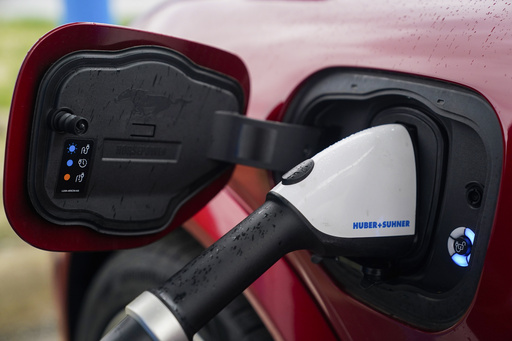The Biden administration has sanctioned over $3 billion to American companies to heighten the domestic production of advanced batteries and other materials needed for electric vehicles. This initiative is part of an ongoing effort to lessen China’s worldwide dominance in battery production for EVs and other electronics. The grants will fuel a total of 25 projects across 14 states, including pivotal states like Michigan, North Carolina, Ohio, Texas, South Carolina, and Louisiana. This funding marks the second round of EV battery funding established under the bipartisan infrastructure law ratified in 2021. An earlier round allocated $1.8 billion for 14 projects that are currently underway. The total amount has decreased from figures announced in October 2022, due to certain projects being withdrawn or rejected during negotiations with U.S. officials. This financial support aligns with President Joe Biden and Vice President Kamala Harris’s strategy to enhance the production and sales of electric vehicles to combat climate change and fortify U.S. manufacturing.
These grants aim to promote companies engaged in processing lithium, graphite, and other battery materials or manufacturing components utilized in EV batteries. Lael Brainard, a White House economic adviser, highlighted that these awards bring the administration closer to establishing an end-to-end supply chain for batteries and critical minerals within the U.S. Brainard emphasized the administration’s commitment to manufacturing batteries crucial for powering the grid, homes, businesses, and the American auto industry. According to Brainard, the awards unveiled on Friday contribute to the nearly $35 billion invested in domestic critical minerals and battery supply chains in the U.S. , including projects like major lithium mines in Nevada and North Carolina, battery factories in Michigan and Ohio, and the production of rare earth elements and magnets in California and Texas.
Brainard mentioned that the U.S. has undertaken rigorous measures to counter China’s dominance in processing and refining minerals and battery production. The administration has enforced higher tariffs on Chinese imports of critical minerals and has implemented measures to promote domestic sourcing for EVs sold in the country. Jennifer Granholm, the Energy Secretary, reiterated the commitment to manufacturing batteries in the United States. The projects announced on Friday are anticipated to support 25 ventures, creating 8,000 construction jobs and over 4,000 permanent jobs. Companies receiving grants are mandated to match them on a 50-50 basis with a minimum investment of $50 million. While federal funding alone may not determine the fate of all projects, it has significantly reshaped the U.S. battery manufacturing sector in recent years, according to Matthew McDowell, an associate professor at the Georgia Institute of Technology.
McDowell expressed enthusiasm about the next generation of batteries for clean energy storage, such as solid-state batteries, which offer the potential to store more energy than lithium-ion batteries.


